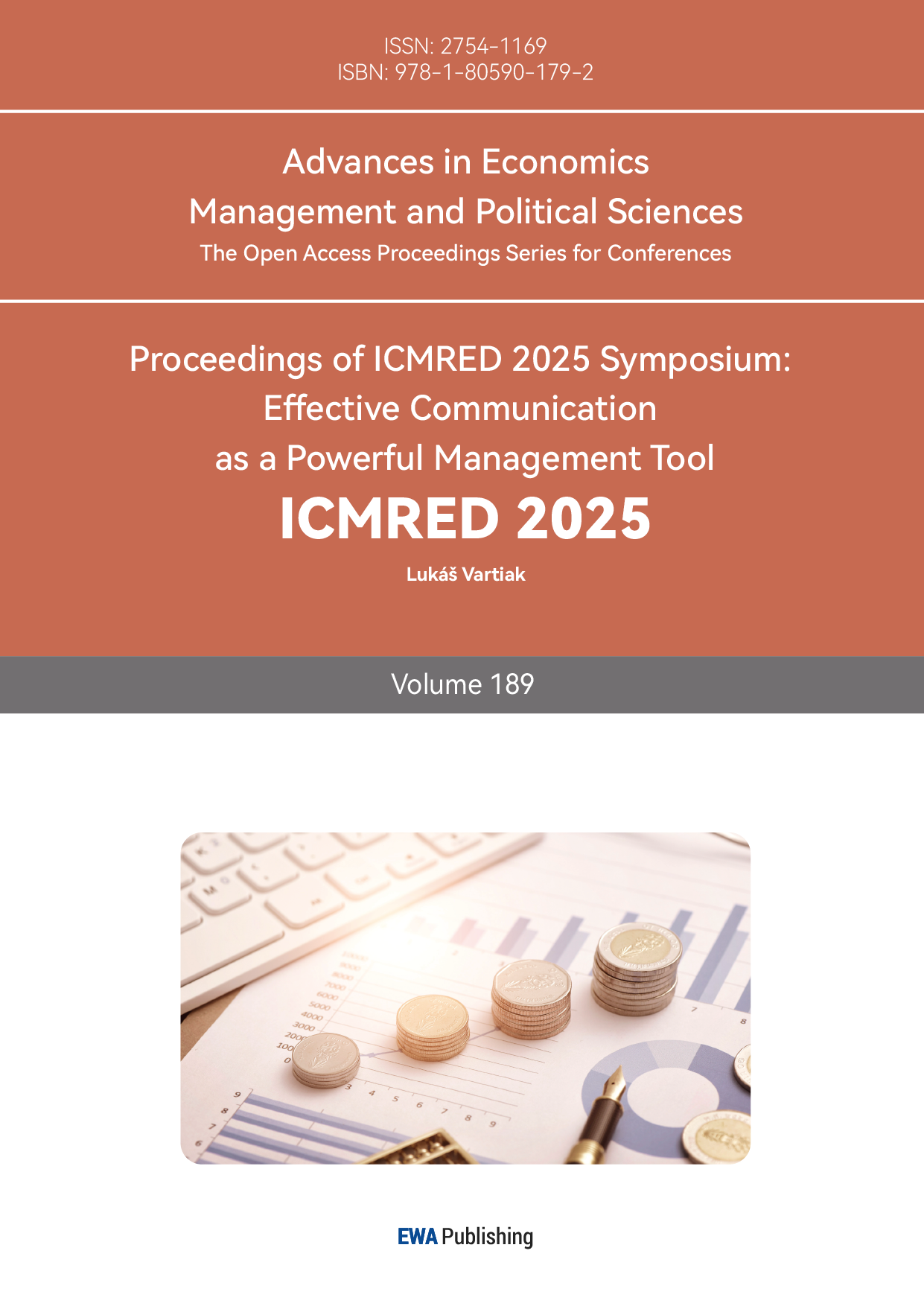References
[1]. Deng Zhenyu. On the Legal Regulation of Brushing Orders in E-commerce[J]. Market Weekly, 2021, 34(04): 178-179+182.
[2]. Lao Dongyan. Research on Business Activities in the Crime of Illegal Business Operation[J]. Modern Law Science, 2024, 46(05): 49-67.
[3]. Ye Liangfang. Normative Analysis and Governance Paths of Brushing Orders and Credit Inflation Behaviors[J]. Law Science, 2018, (03): 177-191.
[4]. Lou Bokun. Criminal acts in comparative perspective: Also on the birth of criminology of criminal acts [J]. Journal of Zhejiang Gongshang University, 2010, (01): 13-18. DOI: 10.14134/j.cnki.cn33-1337/c.2010.01.009.
[5]. Dai Ying, Wu Jiayi. Challenges and pathways of criminal regulation on internet financial platforms [J]. Journal of Hebei Radio & TV University, 2021, 26(04): 73-76. DOI: 10.13559/j.cnki.hbgd.2021.04.017.
[6]. Shen Zhenfu. On the criminal regulation of modern biotechnology risks: A concurrent commentary on Articles 38 and 39 of the Criminal Law Amendment (XI) [J]. Science Technology and Law (Chinese and English), 2021, (03): 65-73. DOI: 10.19685/j.cnki.cn11-2922/n.2021.03.004.
[7]. Yu Li, Chen Zhijun. "Research on Criminal Regulation of Acts Endangering the Safety of Public Transport Vehicles". Policing Studies, 2020, 3(4): 96-122+124.
[8]. Zhang Kuiying. "Analysis of the Concept of 'Crime': A Comparative Study of Criminal Law and Criminology Perspectives". Law and Society, 2010, (10): 8-8. DOI: 10.19387/j.cnki.1009-0592.2010.10.009.
[9]. Bai Xueting. "Reconstruction of the Criminalization Mechanism for Online 'Click Farming and False Review' Behaviors". Shandong University, 2023. DOI: 10.27272/d.cnki.gshdu.2023.002004.
[10]. Zhou Quan. "Criminal Regulation of Organized Click Farming and False Review Behaviors: An Analysis Based on the Crime of Illegal Business Operation". Journal of Changzhi University, 2018, 35(4): 16-19.
[11]. Li Ran, Zheng Yan. "Criminalization and Comprehensive Governance of Positive Click Farming and False Review Behaviors". Journal of Guangxi Police College, 2019, 32(1): 24-29. DOI: 10.19736/j.cnki.gxjcxyxb.2019.01010.
[12]. Ma Yongqiang. "Criminal Law Characterization and Administrative-Criminal Coordination of Positive Click Farming Behaviors". Journal of Law Application, 2020, (24): 63-78.
[13]. Dong Rui. "Research on the Path of Criminal Regulation of Reverse Click Farming Behaviors". Shandong University of Political Science and Law, 2024. DOI: 10.27874/d.cnki.gsdzf.2024.000040.
[14]. Wang Mu. "Criminological Research: Within and Beyond Criminal Law". China Legal Science, 2010, (6): 121-137. DOI: 10.14111/j.cnki.zgfx.2010.06.008.
Cite this article
Tang,X. (2025). Construction of a Criminal Legal Framework for Brushing and Credit Manipulation in the Context of Data Crimes. Advances in Economics, Management and Political Sciences,189,75-84.
Data availability
The datasets used and/or analyzed during the current study will be available from the authors upon reasonable request.
Disclaimer/Publisher's Note
The statements, opinions and data contained in all publications are solely those of the individual author(s) and contributor(s) and not of EWA Publishing and/or the editor(s). EWA Publishing and/or the editor(s) disclaim responsibility for any injury to people or property resulting from any ideas, methods, instructions or products referred to in the content.
About volume
Volume title: Proceedings of ICMRED 2025 Symposium: Effective Communication as a Powerful Management Tool
© 2024 by the author(s). Licensee EWA Publishing, Oxford, UK. This article is an open access article distributed under the terms and
conditions of the Creative Commons Attribution (CC BY) license. Authors who
publish this series agree to the following terms:
1. Authors retain copyright and grant the series right of first publication with the work simultaneously licensed under a Creative Commons
Attribution License that allows others to share the work with an acknowledgment of the work's authorship and initial publication in this
series.
2. Authors are able to enter into separate, additional contractual arrangements for the non-exclusive distribution of the series's published
version of the work (e.g., post it to an institutional repository or publish it in a book), with an acknowledgment of its initial
publication in this series.
3. Authors are permitted and encouraged to post their work online (e.g., in institutional repositories or on their website) prior to and
during the submission process, as it can lead to productive exchanges, as well as earlier and greater citation of published work (See
Open access policy for details).
References
[1]. Deng Zhenyu. On the Legal Regulation of Brushing Orders in E-commerce[J]. Market Weekly, 2021, 34(04): 178-179+182.
[2]. Lao Dongyan. Research on Business Activities in the Crime of Illegal Business Operation[J]. Modern Law Science, 2024, 46(05): 49-67.
[3]. Ye Liangfang. Normative Analysis and Governance Paths of Brushing Orders and Credit Inflation Behaviors[J]. Law Science, 2018, (03): 177-191.
[4]. Lou Bokun. Criminal acts in comparative perspective: Also on the birth of criminology of criminal acts [J]. Journal of Zhejiang Gongshang University, 2010, (01): 13-18. DOI: 10.14134/j.cnki.cn33-1337/c.2010.01.009.
[5]. Dai Ying, Wu Jiayi. Challenges and pathways of criminal regulation on internet financial platforms [J]. Journal of Hebei Radio & TV University, 2021, 26(04): 73-76. DOI: 10.13559/j.cnki.hbgd.2021.04.017.
[6]. Shen Zhenfu. On the criminal regulation of modern biotechnology risks: A concurrent commentary on Articles 38 and 39 of the Criminal Law Amendment (XI) [J]. Science Technology and Law (Chinese and English), 2021, (03): 65-73. DOI: 10.19685/j.cnki.cn11-2922/n.2021.03.004.
[7]. Yu Li, Chen Zhijun. "Research on Criminal Regulation of Acts Endangering the Safety of Public Transport Vehicles". Policing Studies, 2020, 3(4): 96-122+124.
[8]. Zhang Kuiying. "Analysis of the Concept of 'Crime': A Comparative Study of Criminal Law and Criminology Perspectives". Law and Society, 2010, (10): 8-8. DOI: 10.19387/j.cnki.1009-0592.2010.10.009.
[9]. Bai Xueting. "Reconstruction of the Criminalization Mechanism for Online 'Click Farming and False Review' Behaviors". Shandong University, 2023. DOI: 10.27272/d.cnki.gshdu.2023.002004.
[10]. Zhou Quan. "Criminal Regulation of Organized Click Farming and False Review Behaviors: An Analysis Based on the Crime of Illegal Business Operation". Journal of Changzhi University, 2018, 35(4): 16-19.
[11]. Li Ran, Zheng Yan. "Criminalization and Comprehensive Governance of Positive Click Farming and False Review Behaviors". Journal of Guangxi Police College, 2019, 32(1): 24-29. DOI: 10.19736/j.cnki.gxjcxyxb.2019.01010.
[12]. Ma Yongqiang. "Criminal Law Characterization and Administrative-Criminal Coordination of Positive Click Farming Behaviors". Journal of Law Application, 2020, (24): 63-78.
[13]. Dong Rui. "Research on the Path of Criminal Regulation of Reverse Click Farming Behaviors". Shandong University of Political Science and Law, 2024. DOI: 10.27874/d.cnki.gsdzf.2024.000040.
[14]. Wang Mu. "Criminological Research: Within and Beyond Criminal Law". China Legal Science, 2010, (6): 121-137. DOI: 10.14111/j.cnki.zgfx.2010.06.008.









